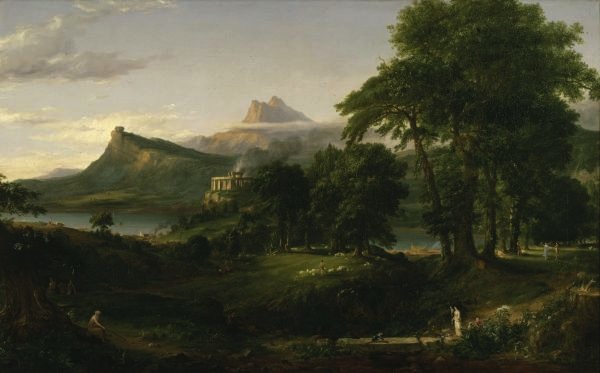Tom Stoppard,
Arcadia, A play.
Setting; Derbyshire, a huge estate still intact but with
landscape changes made after the opening act’s events that are equated to both
concepts in philosophy and melodies in music (waltz the 19th century dance).
The play | The Acts & Scenes | meaning | critical reading | Questions | vocabulary | characters & plots | Themes
Pages
5 Scene
One ACT ONE
19 Scene
Two
39 Scene
Three
47 Scene
Four
57 Scene
Five ACT TWO
71 Scene
Six
77 Scene
Seven
Arcadia, New York: Faber and
Faber, 1993.
Interpretation, costumes and characters:
Read "Words on Plays" 2013 by the American Conservatory Theater
![]()
Arcadia meaning the image or idea of life in the countryside that is believed to be perfect from the Greek ideal and later Roman pastoral traditions that portrayed country-life as being superior to living in cities and towns.
A double
entendre in time and in taste
•
1809 Napoleonic Europe (Sadi Carnot’s ideas on heat and steam engines) a time of optimism and reforms.
•
Contemporary 1990s
(post cold war) – Einstein & time dilation, entropy / feedback, a period of fear and triumph.
Et in Arcadia Ego for
Et in
Arcadia Ego is play
on words / word play
Some double meanings in the play:
Carnal and Carne
Time and existence
Entropy and fire
Fire and sexual desires
Rationalism and Romanticism,
Poet & Botanist, appearances & reality,
Steam engines and natural landscape art,
Tutor & lunatic (hermit),
Professor and novelist,
Experts and novices,
rivalry and duels
George Gordon Lord Byron went to Trinity College Cambridge as did the Tutor, Hodge – who most likely survives, though he is erroneously thought to have killed Chavet in a duel
Questions concerning the themes:
What is true, real, and verifiable?
How has science and mathematics revealed the characteristics of physical materiality?
How precisely is entropy related to spacetime?
How is time a creation of fiction?
Can we recover from loss?
How can we discover the truth or falsity about what happened in the past?
Scenes Seven
scenes in Two acts
Act ONE
1 April 1809, Septimus
Hodge (tutor) – Thomisina Coverly
(student)
2 Contemporary, An English
Don, Bernard meets the writer Hannah at estate
3 School room “God
could make only a cabinet.” (p.41)
4 Hannah
discovers Thomasina Coverly’s
mathematical formula
Act TWO
5 Hannah
(writer), & Valentine (manor lord) her Bernard (Don), lecture
6 The aftermath
of the alleged (not true) duel
7 A mixture of
the two periods to reveal Newton’s replacement by heat loss
Hannah
informs Bernard he is wrong about Chater's death in
the duel
pp.
7 “If you do not
teach me the true meaning of things, who will?”
Fermat’s
last theorem explained by Septimus
41 “Armed thus, God could only make
a cabinet.” Thomisina on Newton’s mathematical formulas
47 “The New Geometry of Irregular
Forms” discovered by Thomisina Coverly
49 “It’s how to look at population
changes in biology.” Valentine on Thomasina’s algorithm
51 “The unpredictable and the
predetermined unfold together to make everything
the way it is. It’s how
nature creates itself . . .Valentine
52 “The future is disorder.”
Valentine on mathematics of grouse populations
63 Hannah explains to us that Byron did not kill Chater in a duel, despite Bernard’s contrary idea that Lord Byron did kill Chater in the duel.
65 “We were quite happy with
Aristotle’s cosmos,” Bernard
69 Hannah & Bernard exchange
canards and divergent views of the past
73 Lady Croom’s
reproach
75 “It is a defect of God’s humour that he directs our hearts everywhere but to those
who have a right to them.”
90 Thomasina to Noakes -– concerning the steam
engine "You can never get out of it what you put in"
Synopsis of the action
Act One 1809
carnal embrace intercourse,
fidelity
Fermat’s last theorem Pythagorean
theorem does not work in 3 + dimensions
Noakes & lanskip architecture -- spy or a redesigner?
the serpent in the garden
Act Two 1995
Bernard's
incorrect lecture read to the family
Bernard
the Oxford Don apparently divulges Byron's mysterious visit and departure
the duel with Chater over his wife
the curious role of Septimus Hodge -- Gordon Lord Byron's, classmate
93 Chater died in Martinique in April 1810 of a monkey bite
having discovered a Dahlia Hanna
One critic notices that:
Tom Stoppard has created a random and chaotic play (as possibly as a playwright can express in writing and crafting a twisted plot) that tests and crumbles our notions of time and space, or past and present order in the narrative of the play. He does so deliberately in an effort to create reality.
Stoppard strives to bring play writing from acts that are arcs and scenes that are angles to organic, unordered, and chaotic forms that more closely represent the conditions of natural existence.
double entendre, means a deliberate attempt to use a phrase that can be taken in one of two ways, or both of those ways at once. "A word or phrase open to two interpretations."
double entendre is inherent in the term Arcadia, meaning paradise literally; while figuratively meaning: the imposition of human contrived landscapes to look more natural on an existing terrain; not just a more picturesque representation of natural settings.
[1]
Tom Stoppard, "Arcadia," New York: Faber and
Faber, 1993.
Arcadia is also available from Amazon. (Read & listen) {hear here!}
[2]
See Leo Marx, for an exposition of "Et in Arcadia Ego" idea (Machine in the Garden).
[3]
Read "Words on Plays" 2013 by the American Conservatory Theater


